The Guardian’s betrayal of Corbyn – and of British democracy

JVL Introduction
Jonathan Cook writes:
“If you are a Labour party member, the Guardian is the only ‘serious’, big-circulation paper claiming to represent your values and concerns.
“One might therefore have assumed that anything that touches deeply on Labour party affairs – on issues of transparency and probity, on the subversion of the party’s democratic structures, on abuses or fraud by its officials – would be of endless interest to the paper.”
Well it hasn’t been! Now read on…
This article was originally published by Jonathan Cook Blog on Mon 10 Aug 2020. Read the original here.
How the Guardian betrayed not only Corbyn but the last vestiges of British democracy
It is simply astonishing that the first attempt by the Guardian – the only major British newspaper styling itself as on the liberal-left – to properly examine the contents of a devastating internal Labour party report leaked in April is taking place nearly four months after the 860-page report first came to light.
If you are a Labour party member, the Guardian is the only “serious”, big-circulation paper claiming to represent your values and concerns.
One might therefore have assumed that anything that touches deeply on Labour party affairs – on issues of transparency and probity, on the subversion of the party’s democratic structures, on abuses or fraud by its officials – would be of endless interest to the paper. One might have assumed it would wish both to dedicate significant resources to investigating such matters for itself and to air all sides of the ensuing debate to weigh their respective merits.
Not a bit of it. For months, the leaked report and its implications have barely registered in the Guardian’s pages. When they have, the coverage has been superficial and largely one-sided – the side that is deeply hostile to its former leader, Jeremy Corbyn.
That very much fits a pattern of coverage of the Corbyn years by the paper, as I have tried to document. It echoes the paper’s treatment of an earlier scandal, back in early 2017, when an undercover Al-Jazeera reporter filmed pro-Israel Labour activists working with the Israeli embassy to damage Corbyn from within. A series of shocking reports by Al-Jazeera merited minimal coverage from the Guardian at the time they were aired and then immediately sank without trace, as though they were of no relevance to later developments – most especially, of course, the claims by these same groups of a supposed “antisemitism crisis” in Labour.
Sadly, the latest reports by the Guardian on the leaked report –presented as an “exclusive” – do not fundamentally change its long-running approach.
Kicked into the long grass
In fact, what the paper means by an “exclusive” is that it has seen documents responding to the leaked report that were submitted by Corbyn and his team to the Forde inquiry – Labour’s official investigation into that report and the circumstances of its leaking. The deadline for submissions to Martin Forde QC arrived last week.
Setting up the Forde inquiry was the method by which Corbyn’s successor, Keir Starmer, hoped to kick the leaked report into the long grass till next year. Doubtless Starmer believes that by then the report will be stale news and that he will have had time to purge from the party, or at least intimidate into silence, the most outspoken remnants of Corbyn’s supporters.
Corbyn’s submission on the leaked report is an “exclusive” for the Guardian only because no one in the corporate media bothered till now to cover the debates raging in Labour since the leak four months ago. The arguments made by Corbyn and his supporters, so prominent on social media, have been entirely absent from the so-called “mainstream”.
When Corbyn finally got a chance to air the issues raised by the leaked report in a series of articles on the Middle East Eye website, its coverage went viral, underscoring how much interest there is in this matter among Labour members.
Nonetheless, despite desperately needing clicks and revenue in this especially difficult time for the corporate media, the Guardian is still spurning revelatory accounts of Corbyn’s time in office by his former team.
One published last week – disclosing that, after winning the leadership election, Corbyn arrived to find the leader’s offices gutted, that Labour HQ staff refused to approve the hiring of even basic staff for him, and that disinformation was constantly leaked to the media – was relegated to the OpenDemocracy website.
That Joe Ryle, a Corbyn team insider, either could not find a home for his insights in the Guardian or didn’t even try says it all – because much of the disinformation he laments being peddled to the media ended up in the Guardian, which was only too happy to amplify it as long as it was harming Corbyn.
A political coup
Meanwhile, everything in the Guardian’s latest “exclusive” confirms what has long been in the public realm, via the leaked report.
Through its extensive documentation of WhatsApp messages and emails, the report shows conclusively that senior Labour officials who had dominated the party machine since the Tony Blair and Gordon Brown eras – and were still loyal to the party’s centre-right incarnation as New Labour – worked at every turn to oust Corbyn from the leadership. They even tried to invent ways to bar him from standing in a rerun leadership election a year later, in 2016, after Owen Smith, the Labour right’s preferred candidate, challenged him.
Corbyn and his supporters were viewed as dangerous “Trots” – to use a derisive term that dominates those exchanges.
The messages show these same officials did their level best to sabotage Labour’s 2017 general election campaign – an election that Corbyn was less than 3,000 votes from winning. Party officials starved marginal seats Corbyn hoped to win of money and instead focused resources on MPs hostile to Corbyn. It seems they preferred a Tory win if it gave momentum to their efforts to rid the party of Corbyn.
Or, as the submission notes: “It’s not impossible that Jeremy Corbyn might now be in his third year as a Labour prime minister were it not for the unauthorised, unilateral action taken by a handful of senior party officials.”
The exchanges in the report also show that these officials on the party’s right privately gave voice to horrifying racism towards other party members, especially black members of the party loyal to Corbyn.
And the leaked report confirms the long-running claims of Corbyn and his team that the impression of “institutional antisemitism” in Labour – a narrative promoted in the corporate media without any actual evidence beyond the anecdotal – had been stoked by the party’s rightwing, Blairite officials.
They appear to have delayed and obstructed the handling of the small number of antisemitism complaints – usually found by trawling through old social media posts – to embarrass Corbyn and make the “antisemitism crisis” narrative appear more credible.
Corbyn’s team have pointed out that these officials – whose salaries were paid by the membership, which elected Corbyn as party leader – cheated those members of their dues and their rights, as well as, of course, subverting the entire democratic process. The submission rightly asks the inquiry to consider whether the money spent by Labour officials to undermine Corbyn “constituted fraudulent activity”.
One might go even further and argue that what they did amounted to a political coup.
The bogus ‘whistleblower’ narrative
Even now, as the Guardian reports on Corbyn’s submission to the Forde inquiry, it has downplayed the evidence underpinning his case, especially on the antisemitism issue – which the Guardian played such a key role in weaponising in the first place.
The paper’s latest coverage treats the Corbyn “claims” sceptically, as though the leaked report exists in a political vacuum and there are no other yardsticks by which the truth of its evidence or the plausibility of its claims can be measured.
Let’s start with one illustrative matter. The Guardian, as with the rest of the corporate media, even now avoids drawing the most obvious conclusion from the leaked report.
Racism was endemic in the language and behaviours of Labour’s senior, rightwing officials, as shown time and again in the WhatsApp messages and emails.
And yet it is these very same officials – those who oversaw the complaints procedure as well as the organisation of party headquarters – who, according to the corporate media narrative, were so troubled by one specific kind of racism, antisemitism, that they turned it into the biggest, most enduring crisis facing Corbyn during his five-year tenure as leader.
To accept the corporate media narrative on this supposed “antisemitism crisis”, we must ignore several things:
- the lack of any statistical evidence of a specific antisemitism problem in Labour;
- the vehement racism expressed by Labour officials, as well as their overt and abiding hostility to Corbyn;
- moves by party officials forcing Corbyn to accept a new definition of antisemitism that shifted the focus from a hatred of Jews to criticism of Israel;
- and the fact that the handling of antisemitism complaints dramatically improved once these rightwing officials were removed from their positions.
And yet in its latest reporting, as with its earlier coverage, the Guardian simply ignores all this confirmatory evidence.
There are several reasons for this, as I have documented before, but one very obvious one is this: the Guardian, like the rest of the British media, had worked hard to present former officials on the right of the party as brave “whistleblowers” long before they were exposed by the leaked report.
Like the BBC’s much-criticised Panorama “investigation” last year into Labour’s alleged “antisemitism crisis”, the Guardian took the claims of these former staff – of their supposed selfless sacrifice to save the party from anti-Jewish bigots – at face value.
In fact, it was likely even worse than that. The Guardian and BBC weren’t just passive, neutral recipients of the disinformation offered by these supposed “whistleblowers”. They shared the Labour right’s deep antipathy to Corbyn and everything he stood for, and as a result almost certainly served as willing, even enthusiastic channels for that disinformation.
The Guardian hardly bothers to conceal where its sympathies lie. It continues to laud Blair from beyond the political grave and, while Corbyn was leader, gave him slots in its pages to regularly lambast Corbyn and scaremonger about Labour’s “takeover” by the supposedly “extreme” and “hard” left. The paper did so despite the fact that Blair had grown ever more discredited as evidence amassed that his actions in invading Iraq in 2003 were crimes against humanity.
Were the Guardian to now question the narrative it promoted about Corbyn – a narrative demolished by the leaked report – the paper would have to admit several uncomfortable things:
- that for years it was either gulled by, or cooperated with, the Blairites’ campaign of disinformation;
- that it took no serious steps to investigate the Labour right’s claims or to find out for itself what was really going on in Labour HQ;
- that it avoided cultivating a relationship with Corbyn’s team while he was in office that would have helped it to ascertain more effectively what was happening inside the party;
- or that, if it did cultivate such a relationship (and, after all, Seumas Milne took up his post as Corbyn’s chief adviser immediately after leaving the Guardian), it consistently and intentionally excluded the Corbyn team’s account of events in its reporting.
To now question the narrative it invested so much energy in crafting would risk Guardian readers drawing the most plausible conclusion for their paper’s consistent reporting failures: that the Guardian was profoundly opposed to Corbyn becoming prime minister and allowed itself, along with the rest of the corporate media, to be used as channel for the Labour right’s disinformation.
Stabbed in the back
None of that has changed in the latest coverage of Corbyn’s submission to Forde concerning the leaked report.
The Guardian could not realistically ignore that submission by the party’s former leader and his team. But the paper could – and does – strip out the context on which the submission was based so as not to undermine or discredit its previous reporting against Corbyn.
Its main article on the Corbyn team’s submission becomes a claim and counter-claim story, with an emphasis on an unnamed former official arguing that criticism of him and other former staff at Labour HQ is nothing more than a “mythical ‘stab in the back’ conspiracy theory”.
The problem is that there are acres of evidence in the leaked report that these officials did stab Corbyn and his team in the back – and, helpfully for the rest of us, recorded some of their subversive, anti-democratic activities in private internal correspondence between themselves. Anyone examining those message chains would find it hard not to conclude that these officials were actively plotting against Corbyn.
To discredit the Corbyn team’s submission, the Labour right would need to show that these messages were invented. They don’t try to do that because those messages are very obviously only too real.
Instead they have tried two different, inconsistent strategies. First, they have argued that their messages were presented in a way that was misleading or misrepresented what they said. This claim does not hold water, given that the leaked report includes very lengthy, back-and-forth exchanges between senior staff. The context of those exchanges is included – context the officials themselves provided in their messages to each other.
Second, the self-styled “whistleblowers” now claim that publication of their messages – documenting efforts to undermine Corbyn – violates their right to privacy and breaches data protection laws. They can apparently see no public interest in publishing information that exposes their attempts to subvert the party’s internal democratic processes.
It seems that these “whistleblowers” are more committed to data concealment than exposure – despite the title they have bestowed on themselves. This is a strange breed of whistleblower indeed, one that seeks to prevent transparency and accountability.
In a telling move, despite claiming that their messages have been misrepresented, these former officials want the Forde inquiry to be shut down rather than given the chance to investigate their claims and, assuming they are right, exonerate them.
Further, they are trying to intimidate the party into abandoning the investigation by threatening to bankrupt it through legal actions for breaching their privacy. The last thing they appear to want is openness and a proper accounting of the Corbyn era.
Shrugging its shoulders
In its latest reporting, the Guardian frames the leaked report as “clearly intended to present a pro-Corbyn narrative for posterity” – as though the antisemitism narrative the Guardian and the rest of the corporate media spent nearly five years crafting and promoting was not clearly intended to do the precise opposite: to present an anti-Corbyn narrative for posterity.
Peter Walker, the paper’s political correspondent, describes the messages of former, rightwing Labour officials as “straying” into “apparent” racism and misogyny, as though the relentless efforts revealed in these exchanges to damage and undermine prominent black MPs like Diane Abbott are open to a different interpretation.
According to Walker, the report’s evidence of election-scuppering in 2017 is “circumstantial” and “there is seemingly no proof of active obstruction”. Even assuming that were true, such a deficiency could easily be remedied had the Guardian, with all its staff and resources, made even the most cursory effort to investigate the leaked report’s claims since April – or in the years before, when the Corbyn team were trying to counter the disinformation spread by the Labour right.
The Guardian largely shrugs its shoulders, repeatedly insinuating that all this constitutes little more than Labour playground bickering. Starmer is presented as school principal – the one responsible adult in the party – who, we are told, is “no stranger to managing Labour factions”.
The Guardian ignores the enormous stakes in play both for Labour members who expected to be able to shape the party’s future using its supposedly democratic processes and for the very functioning of British democracy itself. Because if the leaked report is right, the British political system looks deeply rigged: there to ensure that only the establishment-loving right and centre-right ever get to hold power.
The Guardian’s approach suggests that the paper has abdicated all responsibility for either doing real journalism on its Westminster doorstep or for acting as a watchdog on the British political system.
Guardian hypocrisy
Typifying the hypocrisy of the Guardian and its continuing efforts to present itself a hapless bystander rather than active participant in efforts to disrupt the Labour party’s internal democratic processes and sabotage the 2017 and 2019 elections is its lead columnist Jonathan Freedland.
Outside of the Guardian’s editorials, Freedland’s columns represent the closest we have to a window on the ideological soul of the paper. He is a barometer of the political mood there.
Freedland was among the loudest and most hostile opponents of Corbyn throughout his time as leader. Freedland was also one of the chief purveyors and justifiers of the fabled antisemitism narrative against Corbyn.
He, and the rightwing Jewish Chronicle he also writes for, gave these claims an official Jewish seal of approval. They trumpeted the narrow, self-serving perspective of Jewish organisations like the Board of Deputies, whose leaders are nowadays closely allied with the Conservative party.
They amplified the bogus claims of the Jewish Labour Movement, a tiny, pro-Israel organisation inside Labour that was exposed – though the Guardian, of course, never mentions it – as effectively an entryist group, and one working closely with the Israeli embassy, in that detailed undercover investigation filmed by Al-Jazeera.
Freedland and the Chronicle endlessly derided Jewish groups that supported Corbyn, such as Jewish Voice for Labour, Just Jews and Jewdas, with antisemitic insinuations that they were the “wrong kind of Jews”. Freedland argued that strenuous criticism of Israel was antisemitic by definition because Israel lay at the heart of any proper Jew’s identity.
It did not therefore matter whether critics could show that Israel was constitutionally racist – a state similar to apartheid South Africa – as many scholars have done. Freedland argued that Jews and Israel were all but indistinguishable, and to call Israel racist was to malign Jews who identified with it. (Apparently unaware of the Pandora’s box such a conflation opened up, he rightly – if inconsistently – claimed that it was antisemitic for anyone to make the same argument in reverse: blaming Jews for Israel’s actions.)
Freedland pushed hard for Labour to be forced to adopt that new, troubling definition of antisemitism, produced by the International Holocaust Remembrance Alliance, that shifted the focus away from hatred of Jews to criticism of Israel. Under this new definition, claims that Israel was “a racist endeavour” – a view shared by some prominent Israeli scholars – was treated as definitive proof of antisemitism.
One-party politics
If anyone gave the weaponisation of antisemitism against Corbyn an air of bipartisan respectability it was Freedland and his newspaper, the Guardian. They made sure Corbyn was hounded by the antisemitism claims while he was Labour leader, overshadowing everything else he did. That confected narrative neutralised his lifelong activism as an anti-racist, it polluted his claims to be a principled politician fighting for the underdog.
Freedland and the Guardian not only helped to breathe life into the antisemitism allegations but they made them sound credible to large sections of the Labour membership too.
The rightwing media presented the Corbyn project as a traitorous, hard-left move, in cahoots with Putin’s Russia, to undermine Britain. Meanwhile, Freedland and the Guardian destroyed Corbyn from his liberal-left flank by portraying him and his supporters as a mob of leftwing Nazis-in-waiting.
Corbynism, in Freedland’s telling, became a “sect”, a cult of dangerous leftists divorced from political realities. And then, with astonishing chutzpah, Freedland blamed Corbyn’s failure at the ballot box – a failure Freedland and the Guardian had helped to engineer – as a betrayal of the poor and the vulnerable.
Remember, Corbyn lost by less than 3,000 votes in a handful of Labour marginals in 2017. Despite all this, Freedland and the Guardian now pretend that they played no role in destroying Corbyn, they behave as if their hands are clean.
But Freedland’s actions, like those of his newspaper, had one inevitable outcome. They ushered in the only alternative to Corbyn: a government of the hard right led by Boris Johnson.
Freedland’s choice to assist Johnson by undermining Corbyn – and, worse, to do so on the basis of a disinformation campaign – makes him culpable, as it does the Guardian, in everything that flowed from his decision. But Freedland, like the Guardian, still pontificates on the horrors of the Johnson government, as if they share no blame for helping Johnson win power.
In his latest column, Freedland writes: “The guiding principle [of the Johnson government] seems to be brazen cronyism, coupled with the arrogance of those who believe they are untouchable and that rules are for little people.”
Why should the Tories under Johnson be so “arrogant”, so sure they are “untouchable”, that “rules are for little people”, and that there is no political price to be paid for “cronyism”?
Might it not have much to do with seeing Freedland and the Guardian assist so willingly in the corporate media’s efforts to destroy the only political alternative to “rule by the rich” Toryism? Might the Johnson government have grown more confident knowing that the ostensibly liberal-left media were just as determined as the rightwing media to undermine the only politician on offer who stood for precisely the opposite political values they did?
Might it not reflect an understanding by Johnson and his chief adviser, Dominic Cummings, that Freedland and the Guardian have played a hugely significant part in ensuring that Britain effectively has a one-party state – and that when it returns to being a formal two-party state, as it seems to be doing once again now that Starmer is running the Labour party, both those parties will offer the same establishment-worshipping agenda, even if in two mildly different flavours?
The Guardian, like the rest of the corporate media, has derided and vilified as “populism” the emergence of any real political alternative.
The leaked report offered a brief peek behind the curtain at how politics in Britain – and elsewhere – really works. It showed that, during Corbyn’s time as leader, the political battle lines became intensely real. They were no longer the charade of a phoney fight between left and right, between Labour and Conservative.
Instead, the battle shifted to where it mattered, to where it might finally make change possible: for control of the Labour party so that it might really represent the poor and vulnerable against rule by the rich. Labour became the battleground, and the Guardian made all too clear where its true loyalties lie.
Jonathan Cook writes:
No one pays me to write these blog posts. If you appreciated it, or any of the others, please consider hitting the donate button:

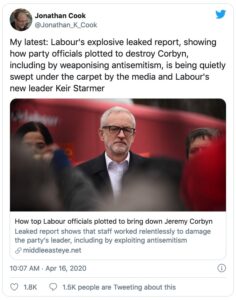
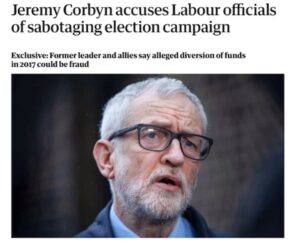
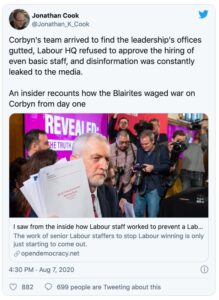

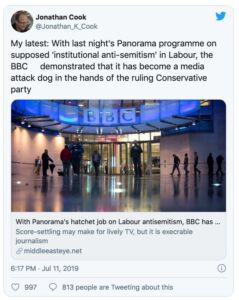
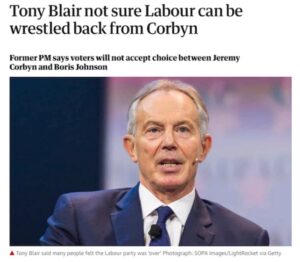


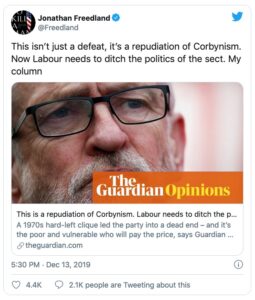

Jonathan Cook is too kind to Jonathan Freedland.
A good article, as you’d expect from Jonathan Cook. Coincidentally, I’ve recently emailed the Guardian Editor on the same issue, suggesting that in the interests of objectivity, she gives a voice to those Jews who oppose the mainstream/Zionist view – but I’m not holding my breath for a positive response!
It may be worth JVL officially approaching her for a meeting to discuss our concerns. Again, I’d be a bit surprised to hear her agree, but worth keeping the pressure on and reminding her that we’re still here.
Excellent article,it says it all, so important to highlight the truth as Jonathan Cook does.An exemplary journalist.
Wrongs need to be highlighted so justice,truth and democracy can live on and Corbyn is right to fight for the truth.
This articulates what I’m sure many true Labour supporters have felt. An establishment coup to conserve the status quo etc. Prevent any equaling-up at all costs and sod society.
I’ve similarly been drawn to the Guardian, more due to the lack of alternatives, but been constantly deflated by the anti-Labour stance, dressed up as Corbyn/anti-semitism virtue-signalling, with no real evidence or it mostly being dredged from pre Corbyn etc.
Toynbee, Freedland, Harris, Crace etc., do not appear unintelligent. They were obviously aware of the ultimate result of a) not accepting Corbyn and trying to influence him, b) actively participating in making him unelectable.
They would not have predicted COVID-19, or the incompetent and harmful (herd immunity) response of the Tories, but we’re fully aware of the incessant carpet-bagging of UK assets, erosion of the NHS, march to Brexit under false pretences etc. They are therefore implicated in the further collapse of the UK as a progressive, green, fair, multicultural, internationalist society. They know this when they look in the mirror.
In my mind, the Guardian is similar to The Taxpayers Alliance; a facade of being for citizen’s benefit, so occasionally showboats by criticising some insignificant policy or action of the Tories, to keep up the pretence it is not an affiliate.
The anti-Semitism slur has been mentioned and promoted by Bannon, as a possible tactic to use on Democrats etc. The Guardian has not merely been duped, en masse. It was a cheer leader.
Disappointed, but not longer surprised.
This post makes depressing reading because every word is true. Thankfully there are still people out there like Jonathan who are fighting to get the truth out.
Another anti-Corbyn rant by the Guardian was Helen Pidd’s claim that Leigh “working class voters” don’t regret voting for Corbyn. Tyskysour on YouTube has a hilarious takedown of the article, as 2 of the 3 people she quotes are a property developer and the owner of a pizzeria she frequents:
https://www.youtube.com/watch?v=bLujzf-ISxY
Another incident that I know about is them interviewing people who write for them as examples of “Joanna and Joe public”, in this case an article on how individual people are responding to the lockdown. This is easy to do if you just use first names and if I know about one instance I suspect there are dozens of them every year.
Laziness seems to be another of the characteristics of the Guardian’s journalism.
I doubt that any perceptive reader goes to the Guardian these days for a radical and insightful take on the news, and Jonathan Cook has been excellent at documenting the reasons why.
One illustration lies in a simple story. Back in (I think) 2007, Alan Rusbridger went on film to describe how he was leaned on by the pro-Israel establishment. His successor has only made extraordinary efforts to exclude related insights and perspectives from the paper, whilst echoing the propaganda of the Jewish Chronicle.
‘Nuff said.
Thank you Jonathan!
Too often I found myself spitting feathers at the shallow opinion pieces the likes of Freedland would write. Not once was he able to support his overt bias with anything of substance.
I took the trouble to write to Toynbee and Gary Younge, about the Guardian’s woeful move away from their more substantive investigative writing and into tabloidesque personality assassination. I wondered why such evidence as ‘The Lobby’ was able to evade the paper’s greater scrutiny.
Toynbee replied with an angry postcard, dismissing my concerns as misinformed. Gary Younge did not bother to reply.
An excellent, well balanced account. Jonathan really is good.
Complaints (genuine or otherwise) relating to anti-Semitism were not the only complaints which were gerrymandered for sectarian political purposes by those such as Hogan, Robinson, Matthews at al.
Of three related non AS complaints I was involved with one was fast tracked within hours whilst two others took two months to get to national level. Hogan, dealing with all three managed to “lose” the two submitted in my name before his departure but not the fast tracked one, possibly involving a GDPR breach via an illegal recording, which concluded fourteen months after it was submitted.
My resubmission went to Robinson and disappeared into a black hole for a further two months requiring a third submission. The total focus of limited staff numbers and time on AS issues resulted in these two complaints taking a further thirteen months to be processed.
Despite detailed Subject Access Requests no data has been supplied providing evidence of any kind of proper investigation or due diligence ten months after being submitted.
These people have further breached the GDPR rights of Party members in using that data in the Panorama programme. Aided and abetted in that criminal act against Party members by Ware.
However, what is worse – and which is only superficially dealt with in this article by Cook – is the clear breach of PPERA 2000 in undermining not just the 2017 election but also the 2019 election and any alternative choice to the current set in aspic status quo.
The franchise of not only Party members but also millions of voters has been deliberately and systematically undermined. In a previous era all those responsible would have been taken through a gate on the Thames.
Such a brilliant and accurate article. It was initially hard to believe the Guardian had sold out to the Establishment and had completely ceased efforts to report truths. It’s not that you want to read news and articles that only reflect your own beliefs. You want news to actually delve deep to draw out the unbiased truth of any situation. The Guardian’s anti Corbyn stance has been stark… Am I naive to ask why they have taken this stance ? Because for many, as a result, it has become a newspaper that has totally lost its appeal.
Although Freedland was undoubtedly the worst, Toynbee and others also quickly fell into line. I think a few of the paper’s journalists have done damage to their reputations. I almost cannot bring myself to read Freedland’s pieces- I find myself thinking, “yes, but,” or ” if only you’d… ” He writes as if he is incapable of honestly addressing his skewed perspective.
It has been the almost total reversion to character assassination opinion pieces I have found most frustrating. The Guardian was once far better than this!
In May of this year I wrote an eight page letter to Kath Viner spelling out why as a loyal reader of 40 plus years I was now cancelling my subscription. Much of what I wrote in the letter alleging their “barrage of vitriol and a campaign of vilification” against Corbyn and alleged antisemitism in the Labour party was based on evidence and information I garnered from Jonathan Cook and many other articles on the JVL site. So thank you Jonathan, thank you JVL and all those that make this a must read site. I’d also like to thank Ghislane Peart and Dr. Felicity Laurence whose letters cancelling their subscriptions were published here and inspired me to finally sever my almost umbilical ties with the paper.
This is a good account which is unfortunately marred in one place by the repetition of the self-serving false narrative of some of Corbyn’s entourage.
Jonathan Cook writes that “the handling of antisemitism complaints dramatically improved once these rightwing officials were removed from their positions.”
This is simply false, unless by “dramatic improvement” you mean nothing more than the number of cases processed and the speed with which cases were handled, and totally ignore the integrity of the process. This is a bit like claiming that the handling of illegal immigrants in the US dramatically improved under President Trump.
As Jamie Stern-Weiner points out in his just published JVL article:
“It was not Starmer, but Corbyn, who accepted as the litmus test for opposition to antisemitism the readiness to suspend or expel members alleged to have expressed anti-Jewish stereotypes. It was not Starmer, but Corbyn, who instituted a “fast track” for expulsions notwithstanding the risks this posed to due process.”
And it was Jenny Formby who implemented the “fast track” process with such enthusiasm that the author of the leaked report boasted that by the end of July last year, her new regime was totally in control of the process.
Coincidentally it was on July 31 2019 that I was first issued with a characteristically Kafkaesque “notice of investigation” which has since been published on this website, together with my reply. If anyone thinks that the handling of my case was an example of a “dramatic improvement”, please let me know. Socialists must be prepared to face the truth even when the truth causes acute discomfort.
I have read Jonathan’s article and also the comments made in response to the article. I cannot disagree with any of the above, and they simply and clearly reflect and mirror my own feelings and thoughts on these issues. I have just finished reading Herman and Chomsky’s seminal work” Manufacturing Consent”, which is both a deeply depressing read, but also relevant to the subject at hand. The core message of the book is that we are consistently lied to, with the mission of the media being the unwavering support of the powers that be, even in the face of overwhelming evidence that these governments and institutions are distorting the facts and peddling false information. At the beginning of the book there is a powerful quote from Milton — “They have put out the people’s eyes and and then reproach them for their blindness”.
I detest Freedland and cannot tolerate his presence in the media, trying to avoid his articles and voice on radio 4. And the slant adopted to the recent revelations is , as proposed by others, is deeply hypocritical, with a pretence of objectivity, whilst subliminally projecting their agenda.
Re. Martin Read’s comment :
“The Guardian was once far better than this!”
The Guardian was once a different paper – before the Scott Trust became a limited company, and a clutch of good journalists were dispensed with.
There are fuller histories to refer to – but I’m short on actual references at this point. Jonathan Cook’s Blog may be the place to start.
Excellent article by an excellent journalist.So good to read the truth being told.
Thank you, very good article.
Jonathan Cook bang on about the Guardian. Correct me if I am wrong. Notices of investigation are still being issued on the basis of trumped up charges of anti semitism against opponents of JLM and Israel. George Wilmers post confirms this as does the case of the Wavetree 4.Why is this still happening and who is actually responsible for this nonsense?
Thank you RH, I had charted the Guardian’s ignoble demise. My wording was, perhaps, a bit vague or clumsy?
I note, more recently, that the ‘i’ newspaper has also fallen under the disingenuous stewardship of the Daily Mail group. Dangerous times!
Alas, Jeremy Corbyn has ridden off into the sunset. You have a new leader now and you must support him or else you risk destabilising your party.
Jeremy’s main fault was that he couldn’t own up to his mistakes especially over his handling of alleged antisemitism in the Labour Party. As the Duc de la Rochefoucauld once said ” No people are more often wrong than those who will not allow themselves to be wrong.”
Jock, given that Jeremy didn’t make any mistakes in relation to the A/S smear campaign, how then could it be possible for him to own up to them. But – just out of curiousity – precisely WHERE would you have him own up to them even if he had?
Would I be right in thinking that you are alluding to what some claim was his appeasement of the Smearers, the saboteurs? I can’t think what else you would be alluding to (although I TOTALLY disagree if THAT is what you DO mean), and if THAT is the case, where would you envisage him making this apology. Perhaps it would go something like THIS: Jeremy contacts the Daily Mail and says I’d like to apologise for not calling out the people AND the MSM who smeared ME and the left-wing membership as anti-semites…. Yes, no problem Jeremy, you put an article together to that effect, and we’ll give the article a prominent position AND give it a big mention on the front page.
I can’t for the life of me understand why Jeremy hasn’t done precisely THAT already! And I’m sure the Sun and Express and the Times and the Telegraph and the Guardian et al would ALL happily cover such an article/apology!
Afterthought: Yes, Jeremy could begin his article something like this…… ‘ I would like to apologise for not sticking up for Ken and Jackie and Chris and Marc and everyone else who was falsely accused of anti-semitism by the Blairites and the MSM and the Jewish newspapers and the CAA and LAA and the JLM and the BoD and LFI and the CST etc. And the reason I didn’t do so before is because they would all have just doubled down and vilified and condemned me as being in denial………’. And he would of course ALSO point out that it was all manufactured and contrived so as to sabotage his leadership of the Labour Party.
Send him an email Jock and suggest the idea to him.
As has been pointed out elsewhere, the Guardian now dodges factual news.
I stopped buying the Guardian many years ago. Its cost is poor value. Its entrenched bias is actually bonkers. The Guardian’s hypocrisy is sickening.
The Guardian was at ease with the concept of New Labour. I guess that the Guardian longs for the glory days of New Labour, though they cannot be repeated. The Guardian drifts pointlessly but now rather nastily. When I was a Guardian reader, in the last century, I felt irriated by this self-proclaimed progressive title employing the same boring, self-opiniated writers.
The Guardian is now down to guarding the high-up’s establishment.
The Guardian has joined in with the ultra-biased ‘mainstream’ media clique.
The Guardian observably does not care about genuine democracy.
The established media voice has lost all credibility, sadly. Hard to understand but they represent a public school, middle class sector of society who think they know what’s right for this country and refuse to consider a deeper narrative based on social justice. It’s an equivalent out of touchness to the Tory version, based on hardened attitudes. No telling them. So I have cancelled my subscription to the Guardian too. Who holds them to account? Corbyn never stood a chance. Out of the wrong drawer…. Hard to fight such lethally entrenched self belief. Except by winning hearts and minds which he did.
Good day Allan ,
It’s amazing how you just keep looking back.I know you are hurting because you believe your former leader was betrayed by the Guardian and pressure from the pro Israel lobby.Jeremy Corbyn was the author of his own demise.If he would have taken prompt and strong action against the antisemitism that sadly exists in some branches of your party he could have saved himself a lot of grief .Your pretence that there is no antisemitism in the party is what we in Australia call a furphy ( an absurd statement ) .To confirm this have a glance at the anti Jewish rhetoric posted on the Twittersphere by many Labour
supporters.
To quote another Australianism.When our great spin bowler Shane Warne was caught taking an illegal substance , he owned up and said “I will cop it on the chin .”Jeremy Corbyn should have done likewise.